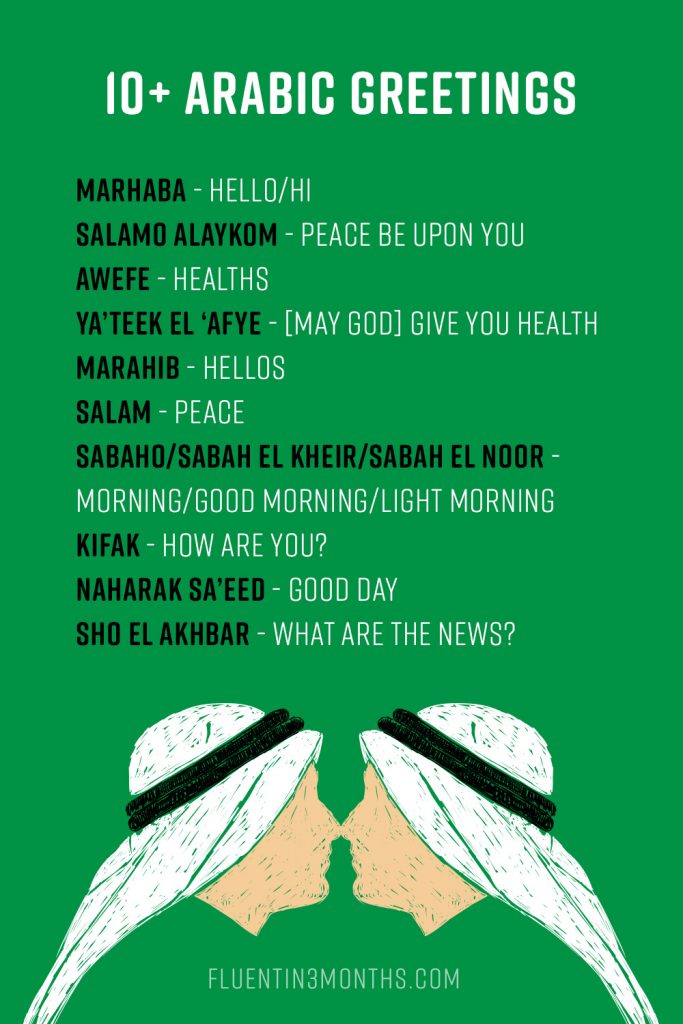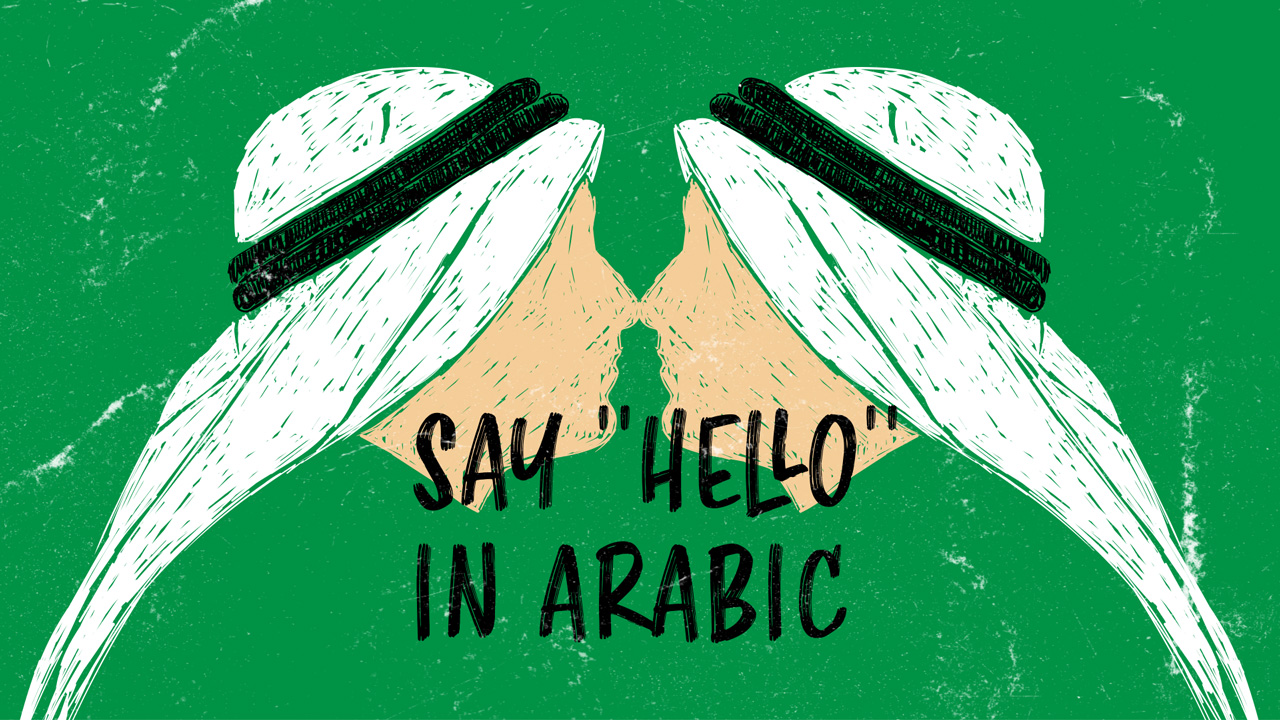10+ Ways to say ”Hello” in Arabic and Other Arabic Greetings
How do you say “hello” in Arabic?
Are you planning to go to the Middle East or North Africa and would like to know the different variations of “hello” in Arabic? Or would you just like to show off in front of your friends that you know how to speak Arabic?
Either way, you have landed on the right page!
Here are 10+ Arabic greetings you can use so you’ll know how to say hello in Arabic, whatever the situation. I’ve also included the literal translations into English.
Here are the greetings you’ll learn:
Table of contents
- 1. مرحبا (Marhaba) – “Hello/Hi”
- 2. Salamo Alaykom – “Peace be Upon You”
- 3. Awefe – “Healths”
- 4. Ya’teek el ‘afye – “[May God] give you health”
- 5. Marahib – “Hellos”
- 6. Salam – “Peace”
- 7. Sabaho, Sabah el Kheir, Sabah el Noor – “Morning (Good morning, light morning)”
- 8. Kifak – “How are you?”
- 9. – Naharak sa’eed – “Good day”
- 10. Sho el Akhbar – “What Are the News?”
- Bonus information on Arabic Greetings
- Say “Hello” in Arabic!
And here’s an infographic you can download for quick reference:

Let’s get started!
1. مرحبا (Marhaba) – “Hello/Hi”
How do you say “hello” in Arabic? The answer is مرحبا (Marhaba).
Marhaba is the simplest type of greeting that is used across the Arabic speaking world.
Marhaba is the ideal general greeting: it is soft to say and is considered to be polite and neutral.
2. Salamo Alaykom – “Peace be Upon You”
Salamo Alaykom is known to be the Muslim greeting.
Salamo Alaykom was the traditional Arabic greeting that was practised when Islam first started spreading. It means “Peace be upon you”.
Wa Alaykom el Salam (“and peace be upon you”) is the typical response, which basically means “And upon you peace”, as in “peace be upon you too”.
Salamo Alaykom is used when speaking to groups of people. Although it is in plural form, it can be used with both a single person or a group.
If you want to be precise though, here are the variations of Salamo Alaykom depending on whom you’re addressing.
- Salamo Alayka – Singular Masculine
- Salamo Alayki – Singular Feminine
- Salamo Alaykoma – Dual (Feminine, masculine or mixed)
- Salamo Alaykonna – Plural Feminine
- Salamo Alaykom – Plural (Can be masculine or mixed)
Nowadays, this is considered to be a religious Islamic greeting, however no one will be offended if it is or isn’t used in this manner!
It’s amazing to see the difference between cultures in how to say “hello”. Look how long Salamo Alaykom is – six syllables! I live in Germany, and our main greeting is Na.
3. Awefe – “Healths”
This is also kind of a soft and nice thing to say. In some regions however, like in the Middle East, it might be considered funny, since it is not typically used.
It basically means: “may you have a lot of health to keep you in shape for all the stuff that you are doing”. That’s why I translated it as “healths” and not “health”, because it is in the plural form, hence “healths”.
Just as a joke, write the word “health” on a lot of small pieces of paper, and throw them at an Arabic-speaking friend. It might take them a while to understand, but it will be funny and worth it.
4. Ya’teek el ‘afye – “[May God] give you health”
This greeting is a bit like Awefe, but this time it is just singular and with the addition that God is referred to in the passive form. The word for “God” is not in the sentence, but is implied. Who gives you health? God gives you health. Hence, “[May God] give you health”. Important point, this is not considered to be religious and can be used in neutral form like Marhaba.
5. Marahib – “Hellos”
This is the plural form of Marhaba. When just one “Hello” is just not enough, you throw all the hellos at them! Marahib!
6. Salam – “Peace”
“We come in peace!” – Martians How nice is it to be greeted with the word peace? This is a calm and soft “peace” to use in greeting. It is basically like Namaste but in Arabic. Peace out.
7. Sabaho, Sabah el Kheir, Sabah el Noor – “Morning (Good morning, light morning)”
Sabah is morning, so Sabaho doesn’t only mean morning; It means “his” morning. Who’s morning? No idea.
- Sabah el Kheir is “good morning”, plain and simple
- Sabah el Noor is the answer for Sabah el Kheir, and means “light morning”.
A typical conversation with these phrases:
- “Good morning”
- “Light morning”
- And then you move on with your day.
Bonus point: Yis’idle Sabahak/ik/kon. This means “Your morning made me happy!” How sweet is that? The “ak”, “ik” and “kon” is the difference between masculine, feminine and plural forms. “Ak” is for masculine, “ik” is for feminine and “kon” is for plural.
8. Kifak – “How are you?”
Kifak becomes Kifik if you’re speaking to a woman. It is the best known way to say “How are you?” in Arabic.
You can also say Kif Halak? which means “How is your health?” Sometimes it comes directly after the Marhaba. So to say it all in Arabic it would be Marhaba, kifak?/Kif halak?
When someone says this to you, you can reply with Lhamdella or Mnih.
Lhamdella is “Thanks, God”, as in thanking Him for being in good health. Mnih is “well” or “good”.
But we all know that we lie by saying “well”. So if you are feeling down or not so much yourself that day, you can reply with meshe lhal. The literal translation of meshe lhal is “the situation is walking”. The closest translation would be “it’s okay”.
9. – Naharak sa’eed – “Good day”
I know I translated this as “good day”, but it doesn’t actually mean “good day”. It means “happy day”. In my humble opinion, wishing someone a “happy day” when you first see that person, is the sweetest greeting ever.
This is more of a “Fusha” a.k.a. “Modern Standard Arabic” than it is around a specific Arabic dialect.
10. Sho el Akhbar – “What Are the News?”
Sho el Akhbar literally means “what are the news” as in, “what’s new?”
You can also say Sho fi ma fi. The literal translation for it would be “What’s in not in?”.
True story. This also means “What’s new”. I wouldn’t use it as a first greeting though. My advice is to use it is right after Marhaba.
Bonus information on Arabic Greetings
Every Arab country has its own dialect, so even Marhaba can be different from one country to another.
For instance in Tunisia they don’t say Marhaba they say aslema which means “on peace” and bislema for goodbyes! In Lebanon however, sometimes they don’t use the word Marhaba, they just go with Cava?!
Say “Hello” in Arabic!
Wow, you’re ready to use Arabic greetings. That’s amazing, it means you can start conversations with people! It could even be your very first step to having a 15-minute conversation in Arabic in 90 days.
Sounds like something you’d like to do?
If you’re set on learning Arabic for good, you will probably love this post on 33 Free Online Arabic classes.
Or you could check what Benny Lewis, founder of Fluent in 3 Months, recommends! He has a go-to list of varied resources to learn Arabic. Watch him speaking in Arabic here!
Original article by Ali Matar, updated by the Fluent in 3 Months team.



Social